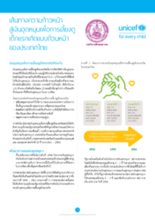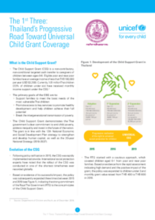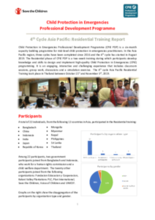This country page features an interactive, icon-based data dashboard providing a national-level overview of the status of children’s care and care reform efforts (a “Country Care Snapshot”), along with a list of resources and organizations in the country.
demographic_data
childrens_living_arrangement
children_living_without_bio
adoption
social_work_force
key_stakeholders
Key Stakeholders
Add New Datadrivers_of_institutionalisation
Drivers of Institutionaliziation
Add New Datakey_research_and_information
Key Data Sources
Add New DataThailand Alternative Care Case Study
Prevalence and number of children living in institutional care: global, regional, and country estimates
Displaying 31 - 40 of 103
"Child representatives and care leavers from South East Asia have called for increased support for continuing education, psychosocial care, finding jobs and affordable housing in the wake of COVID-19," according to this news article from SOS Children's Villages.
This study examined deinstitutionalisation in Thailand. Qualitative interviews were conducted with a total of 27 child welfare practitioners and policy actors to explore their perceptions of Thai alternative care provision.
In this webinar, partners representing the Down to Zero Alliance, governments, and the travel & tourism sector in the region will take stock of the key challenges, including implications of the pandemic, versus progress made up to date in respect to child protection; to commit, through a joint statement calling for the travel and tourism recovery phase to keep child protection as a primary consideration.
The Child Protection Section, UNICEF Thailand Country Office (TCO) is seeking an individual consultant to develop the National Action Plan and Roadmap on Alternative Care.
This animated video from Alternative Care Thailand tells the story of a boy in Thailand who is sent to live in an orphanage because his mother feels she is unable to care for him at home, his experiences with volunteers once he arrives at the orphanage, and how the orphanage transitioned to supporting children to live in families.
This study aimed to examine characteristic and outcome of mothers and babies focusing on the teen-mothers and their existing risk-behaviors, also to evaluate factors associated with subsequent foster care placements of their infants.
This brief from UNICEF describes the Child Support Grant (CSG), a non-contributory, non-conditional targeted cash transfer to caregivers of children between ages 0-6 in Thailand.
This brief from UNICEF describes the Child Support Grant (CSG), a non-contributory, non-conditional targeted cash transfer to caregivers of children between ages 0-6 in Thailand.
This report details the 4th cycle of the Asia Pacific Child Protection in Emergencies Professional Development Programme (CPiE PDP) Residential Training, which took place in Thailand between October 21st and November 3rd, 2019.
Care for Children is seeking to appoint a consultant to undertake an end-of-project evaluation of a three-year project (January 2017 - December 2019): Care for Children's 'Vision for a Million' National Foster Care Projects in China and Thailand.



